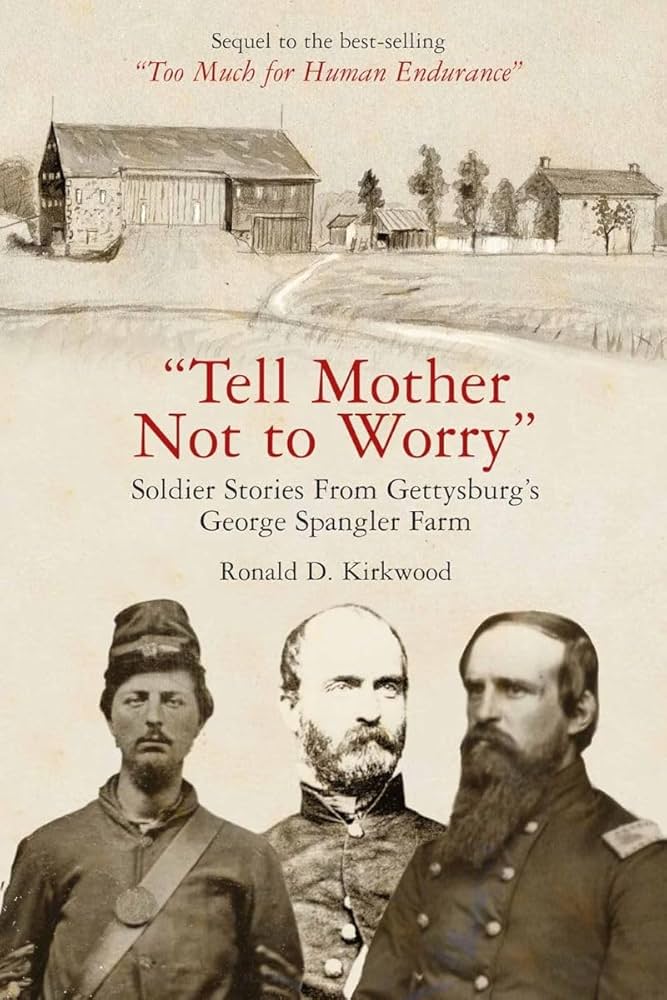Book Review: “Tell Mother Not to Worry”: Soldier Stories from Gettysburg’s George Spangler Farm

 “Tell Mother Not to Worry”: Soldier Stories from Gettysburg’s George Spangler Farm. By Ronald D. Kirkwood. El Dorado Hills, CA: Savas Beatie, 2024. Hardcover, 302 pp. $34.95.
“Tell Mother Not to Worry”: Soldier Stories from Gettysburg’s George Spangler Farm. By Ronald D. Kirkwood. El Dorado Hills, CA: Savas Beatie, 2024. Hardcover, 302 pp. $34.95.
Reviewed by Peter Vermilyea
“The real war,” Walt Whitman famously wrote about the Civil War, “will never get in the books.” With “Tell Mother Not to Worry”: Soldier Stories from Gettysburg’s George Spangler Farm, historian and author Ronald D. Kirkwood continues to try to prove Whitman wrong. “Tell Mother Not to Worry” is a sequel to Kirkwood’s best-selling “Too Much for Human Endurance,” and both books focus on the Union XI Corps hospital at the George Spangler farm during and after the Battle of Gettysburg. It is immediately clear that Kirkwood has been a docent at the Spangler Farm Civil War Field Hospital Site for more than a decade, as he possesses the gifts of a master storyteller. Readers should not be fooled, however; this is not simply a collection of stories about soldiers at the Spangler Farm hospital. Rather, Kirkwood’s contextualized vignettes illuminate the struggles and sufferings faced by the wounded, their families, and medical personnel during the Civil War.
Kirkwood’s research makes this work especially significant. While he relies on many outstanding primary sources—including a wide array of newspapers and the Official Records—and regimental histories, Kirkwood extensively mined the pension records of the men who were treated at the Spangler Farm. This allows the reader not only to firmly grasp how these men were treated and how they suffered, but also how their injuries or deaths impacted their family members. The reader, for example, learns the story of Private Eli Keeler of the 17th Connecticut, who was struck in the chest by a rail from a fence hit by an artillery shell on July 1, 1863. Keeler survived the blow, only to struggle with the resultant “progressive pulmonary disease” that led to his death in 1867. (85)
Especially valuable to the reader is Kirkwood’s deep reading into correspondence between soldiers and their loved ones. He does not pick and choose dramatic quotes for their literary effect, but rather allows soldier stories to unfold through sharing passages from a series of letters written over months of the war. This is done especially well with the story of Private James D. Quilliam of the 154th New York Infantry. In his letters to his wife Rhoda, the reader learns of Quilliam’s hopes that “the war will soon be over,” his wounding at Gettysburg, his weeks of treatment at hospitals, his love for this family, his belief that his service was “removing the curse slavery from our land,” and finally the letter from a Nashville hospital worker reporting his death from a gunshot wound in July 1864. (149-153) Too often, Civil War soldiers are presented as statistics; Kirkwood’s work helps restore their humanity to a twenty-first century audience.
Kirkwood also helps readers understand the massive logistical underpinnings of a Civil War army, including the efforts to produce enough food and water for the more than 1,500 patients at the Spangler Farm hospital, the positioning and movements of the massive Union Artillery Reserve on the property, and the challenges faced by the medical staff in moving the patients when the Confederate artillery bombardment on July 3rd threatened their safety. Additionally, “Tell Mother Not to Worry” contains guest essays from doctors, a biologist, historians, and a social worker that expertly place the medical stories and events of 1863 in a modern context.
Ronald Kirkwood’s “Tell Mother Not to Worry” is a brilliantly researched and well-written book that will be of interest not only for those looking for information about lesser-known aspects of the Battle of Gettysburg, but about the human experience at a Civil War hospital as well.
Peter Vermilyea teaches history in Falls Village, Connecticut, and for the University of Connecticut. The co-director of the Gettysburg College Civil War Institute teacher program, his most recent book is Litchfield County and the Civil War (2024).
Great review, Peter. Many still remember your appearance in Glastonbury for the Lincoln mini symposium.
I am currently reading this book and agree wholeheartedly with the reviewer. The contextualization of the people presented in the book allows the reader to fully understand these people’s lives in totality. A great book.
I loved both books! Very enjoyable to read!
A wonderful review. I can’t wait to start reading it,
A great review that provides important information for someone who is looking for a new and entertaining book about Gettysburg and the Civil War – I am adding this to my reading list. Thank you!